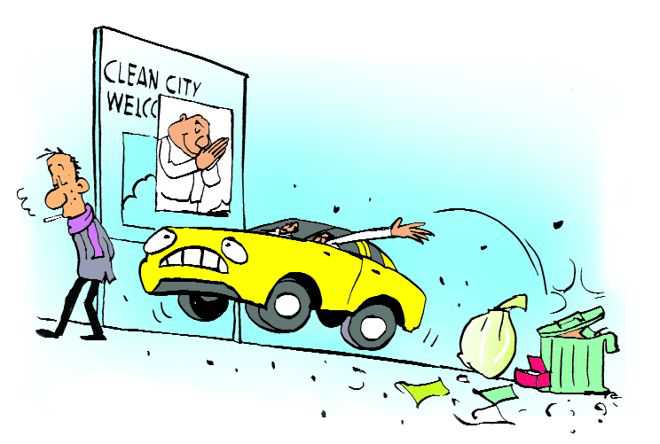MANJU GUPTA
It was the recurring theme of my thoughts: “Unki kameez hum se safed kaise”. The Sun was brighter, the sky clearer, the water blue-er and the land was cleaner. As I inhaled lungs full of unpolluted air, I wondered where we had gone wrong. Weren’t we the agrarians and they an industrial nation. They a consumerist society, we the wise minimalists with ‘reduce and reuse’ ingrained in our being, even if recycling was an alien concept. Weren’t we the cradle of civilised society? Didn’t we teach the world about town planning and civic amenities through the Indus Valley civilisation?
Well, it seems that while we were gloating over our glorious past, they were working towards a better future. They have developed while we continue to claim that we are developing. They woke up while we slept on. More importantly, they woke up as a nation, which means not just the policymakers and the law enforcers but also the common citizen. So, every resident feels the need to do his bit to promote cleanliness and prevent pollution, whether it is segregating garbage or dutifully picking up after their dog.
Back home, the change is noticeable. Some dismiss it as a pre-election propaganda, a last ditch effort to catch the voters’ attention. Some call it a partially fulfilled promise; the promise of a smart city. Whatever be the reason, the effort is visible and welcome. Using flyovers as a giant canvas, social messages and graphics have been painted to inform and adorn. Roads have been widened. Berms have been cleared of weeds and dirt, which will hopefully prevent water stagnation and surface damage. Trolleys (yes trolleys!) full of garbage have been removed from the green belts. Flower baskets hang from electricity poles. Trees and perennials have been planted. Traffic lights work. Garbage is collected door to door. The state in a working state is visible everywhere.
Sadly, the work of the average citizen is visible too. One day the roadside is garbage free and the next day it is strewn with rubbish filled polythene bags, carelessly chucked from a moving car. One day a signboard is hung, the next day it is plastered with a poster of a self-acclaimed leader smiling with fake benevolence. One day a fence is put up to seal the highway, the next day it is broken down for a shortcut across the road. The list is endless; covers removed from manholes, flower pots stolen, cycles borrowed from government stands but never returned, roads blocked to put up tents, cars parked with no consideration, marriage and religious processions stopping traffic, loudspeakers blaring during the night, domestic animals abandoned on roads.
Is it because we are too many or is it because we are too poor? I believe it’s neither. We are the way we are because we have the ability to justify our wrong actions. The common excuse of litterers is that since everyone else is trashing public spaces, what difference can one person make? We are as, Amartya Sen rightly says, the Argumentative Indian, ready to rationalise anything. Which makes me wonder can a city become smart if its citizens refuse to be?
(The writer is a gynaecologist based at Gharaunda)
Unlock Exclusive Insights with The Tribune Premium
Take your experience further with Premium access.
Thought-provoking Opinions, Expert Analysis, In-depth Insights and other Member Only Benefits
Already a Member? Sign In Now










